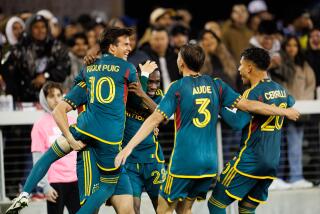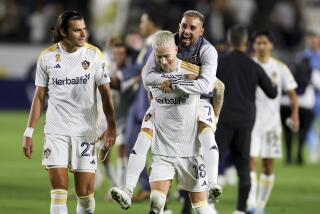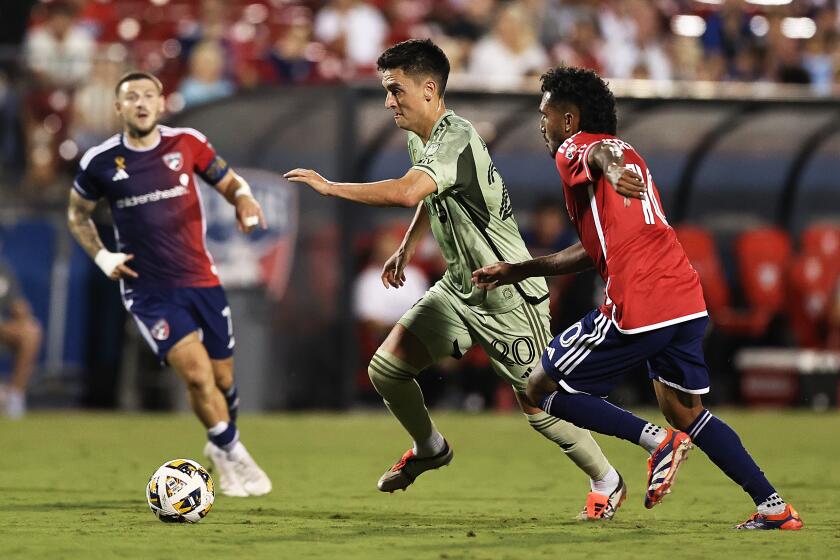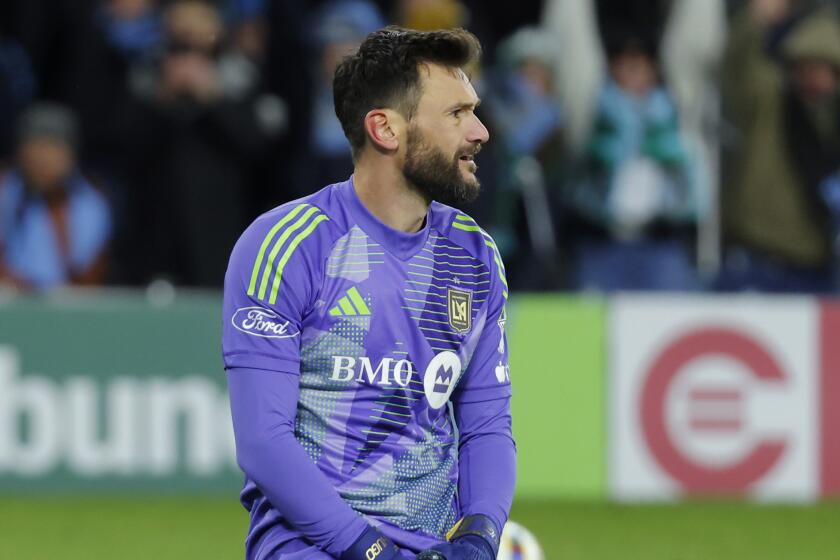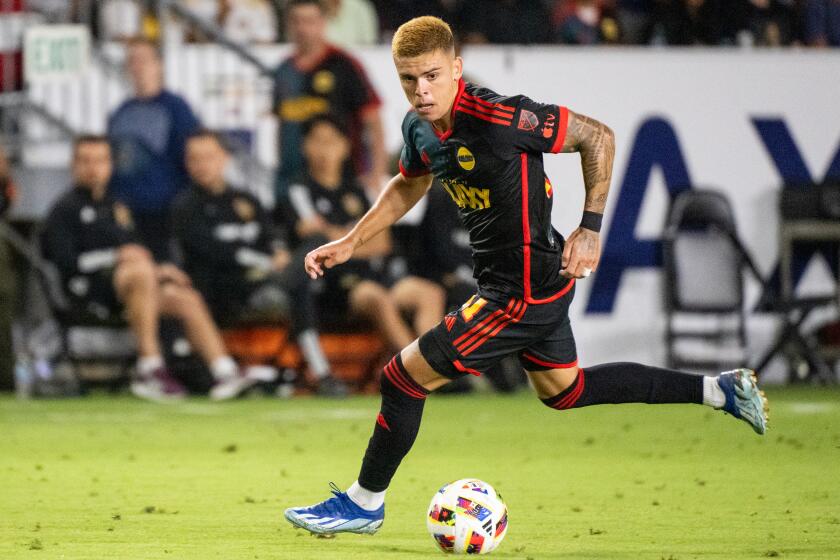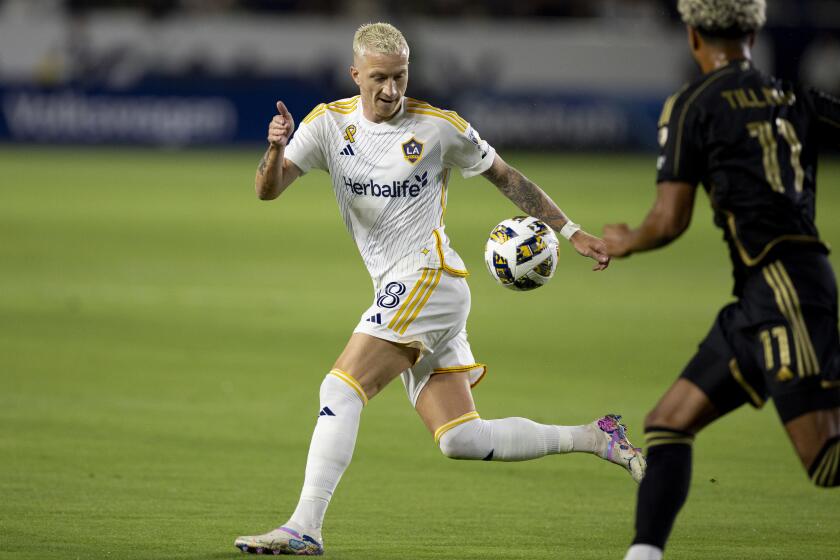David or Goliath?
So here we are, one year later, and David Beckham is strolling across the grass toward a handful of writers huddled like obedient sheep waiting to hear his every word.
It is a Beckham “availability” moment, in the words of the Galaxy, which, one year into the English midfielder’s five-year-tenure in Major League Soccer, still has not quite grasped how to handle its one and only superstar.
The captain of England calls the shots, not the team that pays him $6.5 million a year to lead it to a .500 record.
And so, with the morning’s training session done, Beckham approaches. He smiles. He almost always smiles. It is a tactic meant to disarm, and it invariably works. Twelve months into his MLS stay, he has yet to be asked a difficult or discomforting question.
There have been many ludicrous and simpering ones, but none that raise the hackles.
“Good morning,” Beckham says, and the questions begin.
What Beckham will say this week will not differ much from anything he has said in each of the 52 previous weeks. He will be polite, he will be friendly, and he will say nothing that is even remotely controversial.
The anger that sometimes explodes on the soccer field is kept tightly under wraps in front of the media. What the video cameras, the digital recorders and the notepads get is Beckham-lite.
After 10 minutes or so of providing polite answers to the group, Beckham goes off to play a little one-on-one soccer with son Romeo, and the pair then leave the field by hitching a ride on the equipment cart -- Beckham stretched out across a bag of balls and cones, 5-year-old Romeo riding shotgun.
It would make a good photograph, but there is no photographer there, only a handful of writers staring bleakly down at some sparse and not especially interesting notes.
--
Moving the attendance meter
Tim Leiweke is on the telephone, and the man who helped engineer Beckham’s 2007 move from Real Madrid to the Galaxy is ready to take on the world.
Suggestions from some media quarters that the Beckham buzz has evaporated and that his impact on the sport in the U.S. has been minimal are met with withering scorn.
“To me, that is an indication that they do not know what they are talking about,” says Leiweke, the chief executive of AEG, which counts the Galaxy among its many holdings.
“The fact is that David Beckham, especially this year, has had a tremendous impact on the Galaxy at home, on the Galaxy on the road, on Major League Soccer. You cannot argue when you look at the attendance figures, the revenue figures, the TV ratings, and, most importantly, his play on the pitch.
“The thing that absolutely shocks and amazes me is that there are people who are responsible for telling this story to the community, and they have made a decision that David was overhyped last year, so they have chosen not to cover him or acknowledge him or agree with the fact that he has had a remarkable impact on our sport.
“Shame on them. The guy is going to have 50,000 or 60,000 people in New York . . . and the Red Bulls are averaging what, 10,000 people? [Saturday’s game drew 46,754.] Now excuse me, but how can you not pay attention to the impact this guy is creating?”
Leiweke has a vested interest, obviously, so turn instead to a neutral figure, someone with no tickets to sell or axes to grind, someone such as David Carter, executive director of the USC Sports Business Institute.
The Galaxy is averaging a league-best 25,513 at home and a league-high 27,094 on the road in 2008, but Carter questions whether it is the sport or the celebrity that is bringing out the fans.
“MLS and the Galaxy cannot expect to thrive based on the snapshot that has been David Beckham this past year,” he says. “But he has driven a lot of interest.
“The key is, do the people distinguish between the buzz and the hype and the quality of play, or do they, like most Angelenos, just sort of want to be attending a hip thing?”
--
The long-range plan
Beckham is making his way out of the Home Depot Center, wandering through the tunnels beneath the stadium in search of his polished-to-a-gleam black SUV, the one with the No. 23 emblazoned on the grille.
The temptation is to ask whether he thinks he has made a difference since his first game with the Galaxy exactly one year ago, whether he has “moved the needle” at all in terms of changing America’s attitude toward a sport that has made him a millionaire many times over.
And so someone does.
“A year’s gone by and I think we’ve moved it slightly,” he says. “But I also said when I first moved here that it’s not going to take a year or two. It’s going to take five or 10 years to make this league grow to a much higher level.
“The problem is, people want results straight away.”
It is more likely that Beckham’s influence will be long-term, being recognized only years after he has moved on to other endeavors.
Pele, after all, attracted huge crowds in the 1970s while with the Cosmos, but it wasn’t until two decades later that his impact was felt -- when players such as Tab Ramos, Tony Meola and John Harkes, who had watched the Brazilian play at the Meadowlands, grew up and starred in the U.S.-hosted World Cup of 1994.
Beckham probably is inspiring and motivating youngsters in the same way, players who could be representing the U.S. in the 2014 or 2018 World Cup.
“Exactly,” he says. “That’s what it’s going to be like. You see so many families turn up with their young kids and watch the Galaxy playing. In 10 years’ time, those young kids are going to be 15 and 16 years old and turning around and saying, ‘I remember when we saw the Galaxy play.’
“It might take that long, but hopefully we’ve made the footprint that obviously takes it further on.”
--
Soccer’s sea change
Sunil Gulati is in town, and the president of U.S. Soccer still is marveling at the ratings generated by ESPN’s live coverage last month of Euro 2008.
“Something extraordinary happened,” he says. “The European Championship became water cooler talk in the United States. People who don’t know that I’m involved in soccer were talking about what they had seen.
“That wasn’t the World Cup. It wasn’t the U.S. team. That was phenomenal.”
It is part of a sea change that is occurring as soccer, spurred by the likes of Beckham, the Chicago Fire’s Cuauhtemoc Blanco and the promise of other international MLS stars to come, moves slowly into the mainstream.
“I think there is absolutely a change,” Gulati says. “Is it where we want to be? The answer is no. But there’s no doubt that the sport has a much greater presence than it did a decade ago or even five years ago.”
Ivan Gazidis, the deputy commissioner of MLS, agrees.
“David is a significant piece in the puzzle, but not the whole puzzle,” he says.
“If there’s an expectation that any player on their own can create a soccer culture in the U.S., that’s unrealistic. But the soccer culture already exists, and I don’t think that any player could have had the impact with the general public that David Beckham has had.
“Clearly, he has put us on the map internationally and focused a lot of attention on the league.”
Funnily enough, while Americans in large numbers were absorbed by Euro 2008, Beckham himself paid scant attention, his own England team having narrowly failed to qualify.
“I wasn’t watching it, to be honest,” he says. “The only games I watched were the Spain games. Those were the only games I could bring myself to watch, being an England player and England fan.”
--
Marketing and positioning
USC’s Carter has been to Carson and has seen Beckham play. He also was one of those who watched Euro 2008.
“That was great entertainment, great theater,” he says. “That would work here because of the passion, the quality of play, the pageantry of the tournament. Those international teams carry with them some of the greatest stars and personal brands in sports, people that you love or love to hate.
“For better or worse, MLS has not gotten to that point, but I strongly believe they are headed in that direction. They have the financial stability and now they can build upon that. They can be bold and make some global sports news by bringing in some of these players.
“Frankly, right now it doesn’t really matter if they’re past their prime because they’re as much about marketing and positioning MLS as they are about scoring goals and delivering a high quality of play.
“Fans in this country don’t expect a winner all the time, but they expect the league and the team that they follow to be doing everything they can to be putting a winner on the field and creating the right environment to watch the game. It’s undeniable that the Galaxy, AEG and MLS have done that.
“Beckham can drive them through the turnstiles, but it’s up to everybody else involved to make them come back.”
--
--
Drawing power of David Beckham
These are the attendance figures for David Beckham’s first MLS match in each of the league’s cities, compared with the team’s 2007 average attendance:
*--* TEAM AVERAGE FIRST BECKHAM -- ATTENDANCE GAME ATTENDANCE Chicago 16,490 21,374 Chivas USA 14,305 Yet to play there Colorado 14,749 18,713 * Columbus 15,230 Yet to play there Dallas 15,145 22,331 * D.C. United 20,967 46,686 Houston 15,883 Yet to play there Kansas City 11,586 Yet to play there New England 16,787 Yet to play there New York 16,530 66,237 Real Salt Lake 15,960 25,571 San Jose 16,483 39,872 Toronto FC 20,130 Yet to play there *--*
Note: 2008 average attendance to date for expansion San Jose.
* Sellouts.
